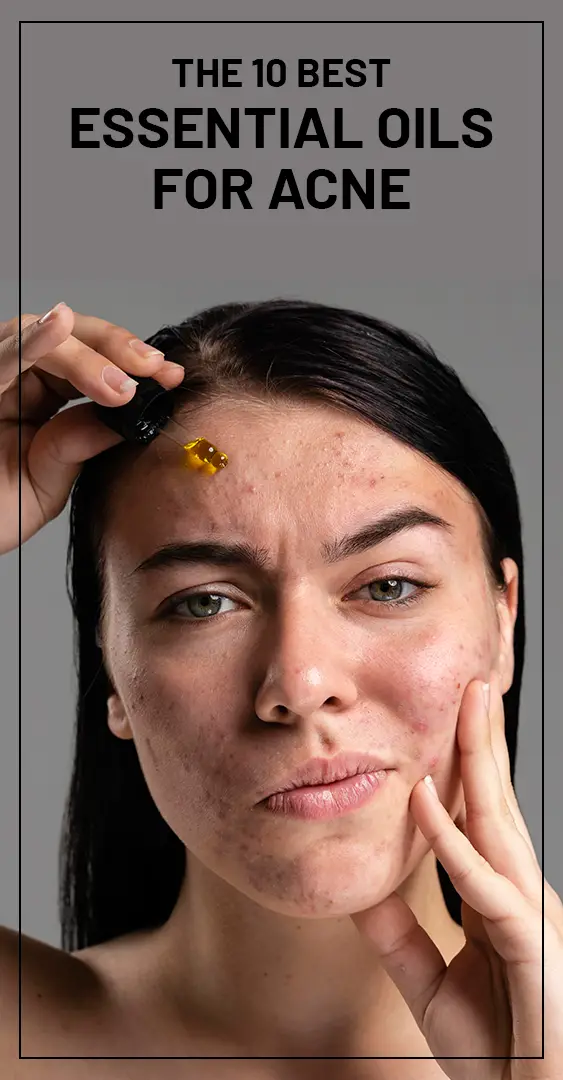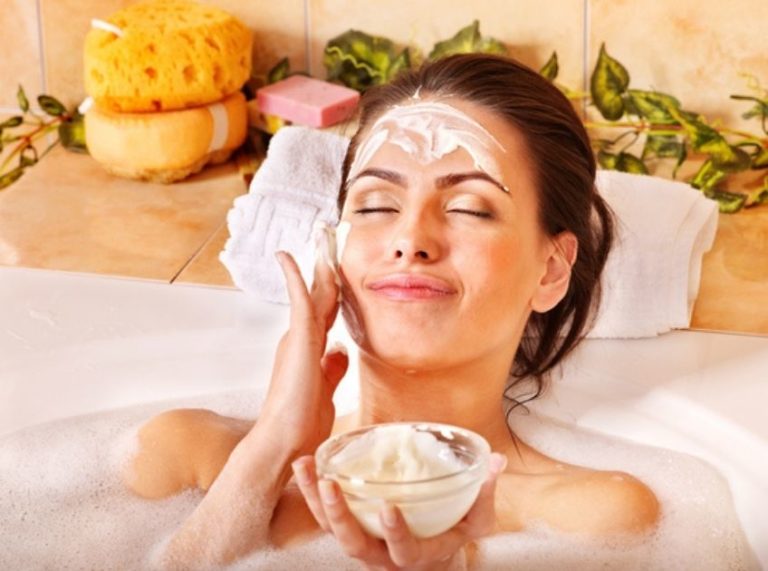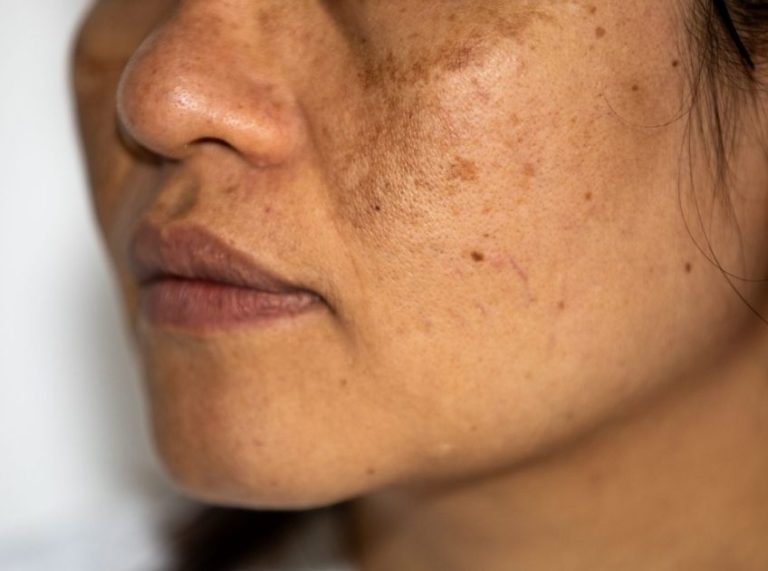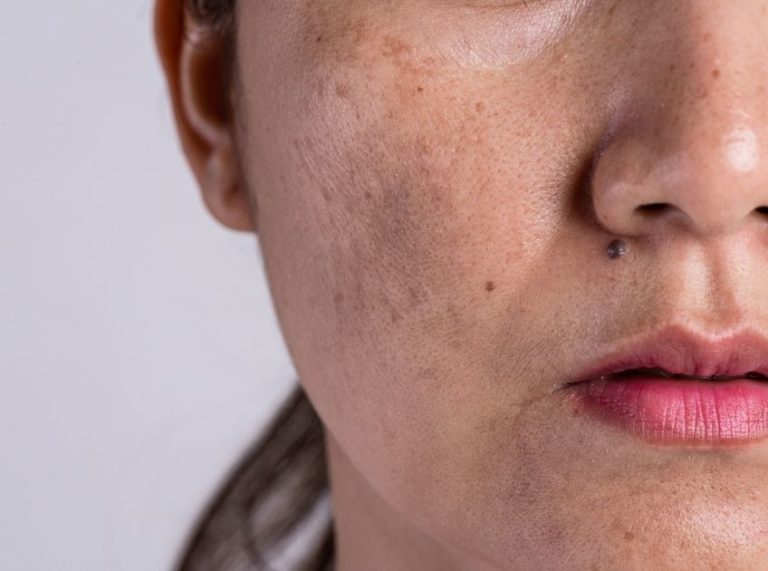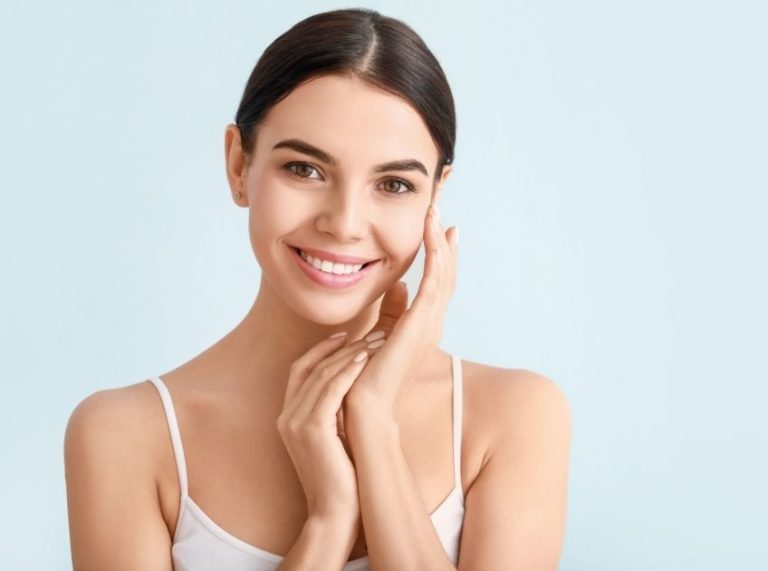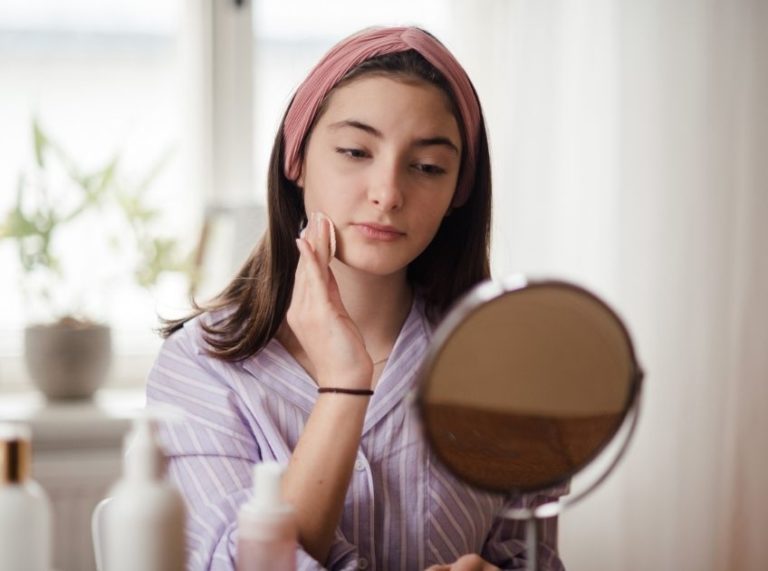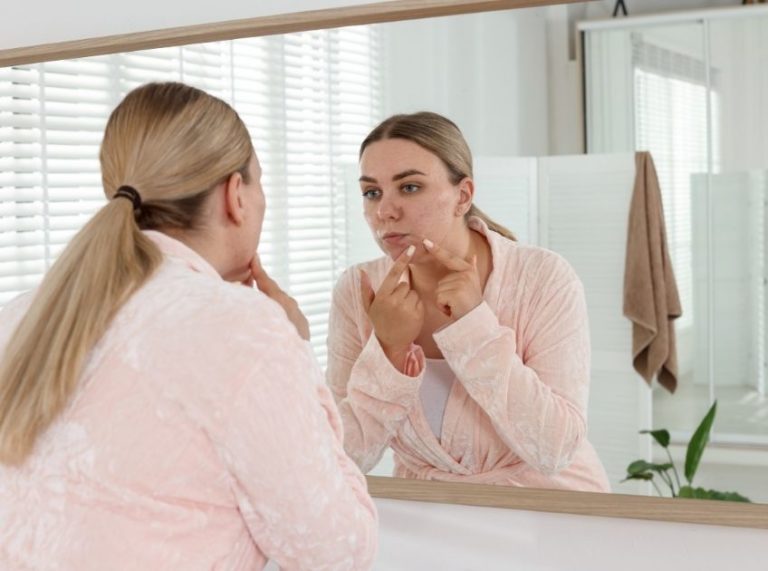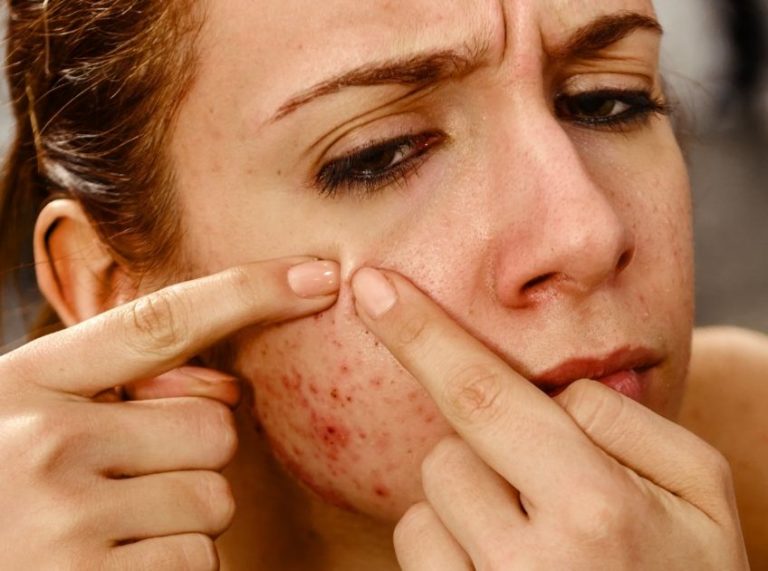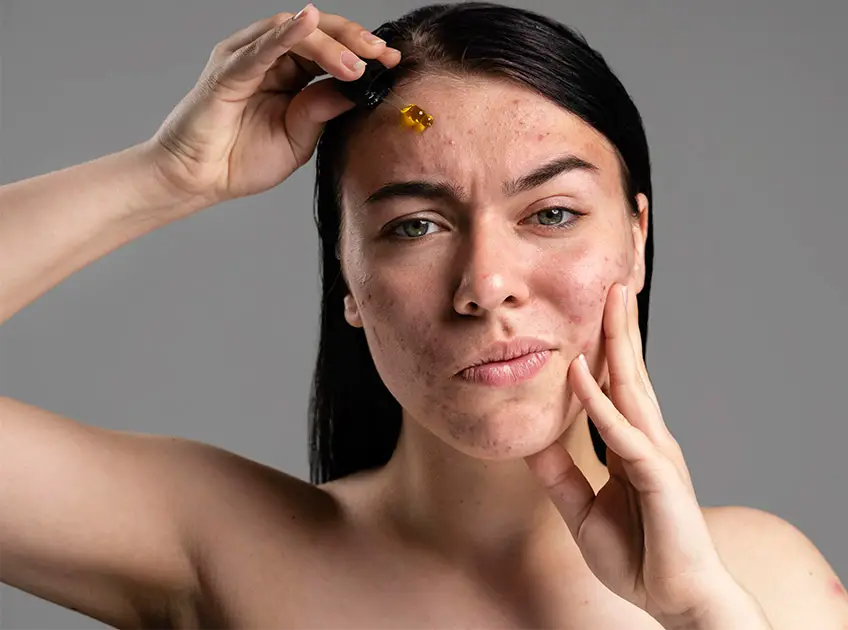
Important: This article is for informational purposes only. Please read our full disclaimer for more details.
Acne is a very common skin condition that affects people of all ages. While there are many medical treatments available, some people prefer to use home remedies. Essential oils are one type of home remedy that can be used to treat acne. Some essential oils have anti-inflammatory and antibacterial properties, which may help reduce the appearance of acne.
There are many different types of essential oils, so it’s important to choose the right one for your skin type. It’s also important to understand how to properly dilute and apply essential oils before using them on your skin.
What Causes Acne?
Acne is caused by a combination of factors, including genetics, hormones, and the overproduction of oil in the skin. When the pores of the skin become blocked, oil and dead skin cells can build up, leading to the development of pimples, blackheads, and whiteheads.
How Can Essential Oils Help?
Essential oils can help to treat acne by reducing inflammation, minimizing the appearance of blemishes, and preventing the overproduction of oil. Some essential oils also have antibacterial properties, which can help to kill the bacteria that can cause acne. You can either apply diluted essential directly on your face or use a diffuser or facial steam.
What are the Best Essential Oils for Acne?
This article will provide an overview of 10 different essential oils that can be used to treat acne. They are: Tea tree oil, Rosemary oil, Lavender oil, Thyme oil, Cinnamon oil, Oregano oil, Eucalyptus oil, Peppermint oil, Lemongrass oil and Rosehip oil.
[Read More : How To Use Argan oil for Acne?]
1. Tea Tree Oil

Tea tree oil is an essential oil that comes from the leaves of the tea tree (Melaleuca alternifolia). Tea tree oil has been shown to be effective in treating acne due to its anti-inflammatory and antibacterial properties. To use tea tree oil for acne, you can apply it directly to the skin or add a few drops to a carrier oil, such as jojoba, olive oil or coconut oil. You can then massage the mixture into your skin. It’s important to remember that tea tree oil can be drying, so it’s best to use it in moderation. If you have dry skin, you may want to consider using a different essential oil. [1]
[Read More : How to Use Cod Liver oil for Acne]
2. Rosemary Oil
Rosemary oil is an essential oil that comes from the leaves of the rosemary plant (Rosmarinus officinalis). Rosemary oil has been shown to be effective in treating acne due to its anti-inflammatory and antibacterial properties. To use rosemary oil for acne, you can add a few drops to a carrier oil, such as jojoba, olive oil or coconut oil. You can then massage the mixture into your skin. [2]
3. Lavender Oil

Lavender oil is an essential oil that comes from the flowers of the lavender plant (Lavandula angustifolia). Lavender oil has been shown to be effective in treating acne due to its anti-inflammatory and antibacterial properties. To use lavender oil for acne, you can add a few drops to a carrier oil, such as jojoba, olive oil or coconut oil. You can then massage the mixture into your skin.
[Read More : How to Remove Blackheads for Oily Skin?]
4. Thyme Oil
Thyme oil is an essential oil that comes from the leaves of the thyme plant (Thymus vulgaris). Thyme oil has been shown to be effective in treating acne due to its anti-inflammatory and antibacterial properties. To use thyme oil for acne, you can add a few drops to a carrier oil, such as jojoba, olive oil or coconut oil. You can then massage the mixture into your skin. [3]
[Read More : Tea Tree Oil For Acne Scars – Benefits & Uses]
5. Cinnamon Oil
Cinnamon oil is an essential oil that comes from the bark of the cinnamon tree (Cinnamomum verum). Cinnamon oil has been shown to be effective in treating acne due to its anti-inflammatory and antibacterial properties. To use cinnamon oil for acne, you can add a few drops to a carrier oil, such as jojoba, olive oil or coconut oil. You can then massage the mixture into your skin.
[Read More : How to Use Bio oil for Acne Scars?]
6. Oregano Oil
Oregano oil is an essential oil that comes from the leaves of the oregano plant (Origanum vulgare). Oregano oil has been shown to be effective in treating acne due to its anti-inflammatory and antibacterial properties. To use oregano oil for acne, you can add a few drops to a carrier oil, such as jojoba, olive oil or coconut oil. You can then massage the mixture into your skin. [4]
7. Eucalyptus Oil
Eucalyptus oil is an essential oil that comes from the leaves of the eucalyptus tree (Eucalyptus globulus). Eucalyptus oil has been shown to be effective in treating acne due to its anti-inflammatory and antibacterial properties. To use eucalyptus oil for acne, you can add a few drops to a carrier oil, such as jojoba, olive oil or coconut oil. You can then massage the mixture into your skin. [5]
8. Peppermint Oil
Peppermint oil is an essential oil that comes from the leaves of the peppermint plant (Mentha piperita). Peppermint oil has been shown to be effective in treating acne due to its anti-inflammatory and antibacterial properties. To use peppermint oil for acne, you can add a few drops to a carrier oil, such as jojoba, olive oil or coconut oil. You can then massage the mixture into your skin. [6]
9. Lemongrass Oil
Lemongrass oil is an essential oil that comes from the leaves of the lemongrass plant (Cymbopogon citratus). Lemongrass oil has been shown to be effective in treating acne due to its anti-inflammatory and antibacterial properties. To use lemongrass oil for acne, you can add a few drops to a carrier oil, such as jojoba, olive oil or coconut oil. You can then massage the mixture into your skin.
10. Rosehip Oil
Rosehip oil is an essential oil that comes from the seeds of the rosehip plant (Rosa canina). Rosehip oil has been shown to be effective in treating acne due to its anti-inflammatory and antibacterial properties. To use rosehip oil for acne, you can add a few drops to a carrier oil, such as jojoba, olive oil or coconut oil. You can then massage the mixture into your skin. This Oil Needs More Studies to Know Its Efficacy on Acne
How to Use Essential Oil to Treat Acne?
Using essential oils to treat acne is a simple and effective way to reduce the appearance of blemishes and promote healing. However, it’s important to remember that essential oils are very concentrated and should be used with caution. It’s always best to start with a low concentration of oil and increase the amount as needed. Be sure to patch test the oil on a small area of skin before using it over your entire face.
When Using Essential Oils to Treat Acne, Be Sure To
1. Use a Carrier Oil: Essential oils should always be diluted with a carrier oil before being applied to the skin. This will help to reduce the risk of irritation.
2. Perform a Patch Test: Before using an essential oil on your skin, it’s important to perform a patch test. This will help to ensure that you’re not allergic to the oil.
3. Use Only a Small Amount: Essential oils are very concentrated and should be used sparingly. A little goes a long way!
4. Avoid Getting the Oil in Your Eyes: Essential oils can be irritating to the eyes. Be sure to avoid getting the oil in your eyes.
5. Discontinue Use If You Experience Irritation: If you experience any irritation when using an essential oil, discontinue use immediately.
Preventions
There are a few things you can do to help prevent acne
- Keep Your Skin Clean: Wash your face twice a day with a mild soap or cleanser. Avoid scrubbing or picking at your skin.
- Avoid Pollution and Irritants: Protect your skin from pollution and other irritants.
- Don’t Smoke: Smoking can contribute to the development of acne.
- Eat a Healthy Diet: Eating a healthy diet can help to keep your skin healthy. Avoid processed foods, sugary drinks, and dairy products.
- Get Enough Sleep: Getting enough sleep is important for overall health and can help to keep your skin healthy.
- Reduce Stress: Stress can contribute to the development of acne. Try to reduce stress by getting enough sleep, exercising, and practicing relaxation techniques.
When to See a Doctor?
If you’re concerned about your acne, make an appointment to see your doctor. They can help you determine the cause of your acne and recommend treatment options.
Caution: Pregnant women or breastfeeding women and children under 12 years old should not use essential oils. If you have any medical conditions, please consult your doctor before using essential oils. Keep all essential oils out of reach of children and pets. Store in a cool, dark place. If you experience any adverse reaction, discontinue use immediately and seek medical attention if necessary. So, if you are worried about acne, don’t be. Use these essential oils to get rid of acne and have a clear skin. However, remember to use them with caution as they are concentrated and can cause irritation if not used properly. Hope you have found this article helpful. If you have any questions or comments, please feel free to leave them below.
Thanks for reading!
Related Articles:
- 10 Calming Essential Oils for Relaxation
- How To Get Rid Of Pimples Naturally Overnight & Fast
- How Do You Use Coconut oil for Acne?
- How to Use Castor oil for Acne?
- How to Use Olive oil for Acne Treatment?
- How to Use Tea Tree Oil to Treat Acne
- 7 Best Essential Oils For Hair Growths
- 10 Best Essential Oils for Headaches
- Essential Oils for Hair Loss: Benefits and How to Use
- How to Use Jojoba Oil for Acne
